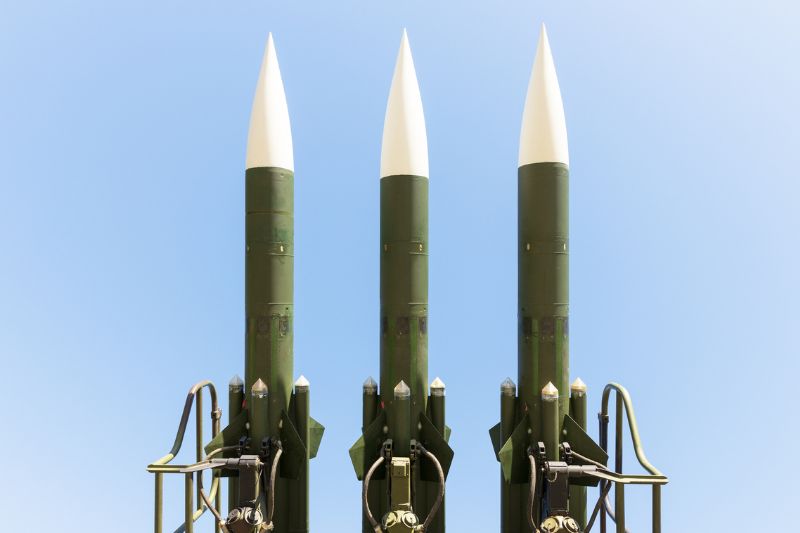In her 1933 novel All That Swagger Miles Franklin noted how the world can slide into war. Her authorial voice says ‘Ethically progressive mentality and engines of war are incompatible’. Almost a century later Australia has accepted a development in which an entire era is to be driven by murderous weapons. Our government has embraced the advent of the ‘missile age’.

It is distressing to read the transcript of the press conference at which this latest abandonment of Australian sovereignty was announced. The assembled journalists – likely defence specialists operating with a military paradigm – did not ask questions about the ethical implications of the Government’s decision to embrace the so-called ‘missile age’. Media were interested solely in easily accessible aspects of the policy change, including the possible economic impacts in local regions.
Minister for Defence Industry Pat Conroy announced that Australia would accelerate missile manufacture. This project would be run by Lockheed Martin Australia, a subsidiary of the US arms manufacturer. He might have admitted that the production of missiles is at the behest of the US Administration and the US military-industrial complex. Whether the US is doing this for profit or for strategic reasons its self-interestedness is obvious. It is doubtful that this development benefits Australia and unlikely that the decision was taken here rather than in Washington.
This announcement marks yet a further brick in the wall of Australia’s integration into the foreign policy of another power. This is a low point in our subservience. Australian foreign policy is now debilitated by the willingness of our government to see foreign policy as a very minor arm of defence interests – and that means military imperatives.
The announcement lacks any sense of ethical content. The concept of a ‘missile age’ should not go without intensive debate and questioning. The implications of Australia becoming a missile base are dire. Missiles do not defend their base. They target and kill enemies. Increasingly in modern times, these supposed enemies are civilians, including women and children who cannot defend themselves. Indeed civilian populations should not have to fear bombardment from anywhere, let alone a country such as Australia which supposedly abhors terrorism. Missile capability threatens to rain terror on these perceived enemies.
Currently the military can strike targets at a range of some 40 kilometres. The Government aims to increase the range to 1,000 kilometres. This is a huge increase in our killing power. How many Australians think that we need such a power or indeed want it?
'Military interests, through investment, employment and propaganda, permeate society, economy and politics more thoroughly than ever before. Not all militarists wear uniforms.'
This rush to the missile age is part of a broader escalation of the arms race in regions hitherto peaceful. Once, countries of the south including Australia and New Zealand had the advantage of being away from major centres of cold war tension, and so were respected as being honest brokers in issues such as a nuclear-free Pacific. Unfortunately, this is no longer the case.
Whether others have brought about the advent of the ‘missile age’ and we are responding remains debatable. What is clear is that having such capability places our position of goodwill in the region under a cloud. Foreign policy should not be conducted in an atmosphere of threat. Neighbouring governments must speak freely and frankly about the issues we have in common, including China’s influence in the Pacific region. $37 million spent on overseas aid would be a good investment in goodwill. Missiles breed suspicion and ill will.
Australian peace activists must be shocked rather than surprised at this latest increment in the country’s militarisation. Not surprised – Australia’s attitude to military engagement has always been that we send cannon fodder off shore, so sending missiles roaming the globe to rain destruction down on civilians is merely the same policy in different form.
Military interests, through investment, employment and propaganda, permeate society, economy and politics more thoroughly than ever before. Not all militarists wear uniforms. They sit in board rooms, reap profits, and are drawn into dependence on military production through seemingly innocent and remote contracts. There are no dividends for social spending in this plan. Rather, schools, aged care and hospitals will suffer.
It is a crude but perhaps accurate analogy that the military-industrial complex resembles a virus. It disperses, mutates and infects and its point of origin is impossible to detect. The ‘missile age’ announcement has the potential to spread a nasty thread of militarism through Australian society. It is a variant of the ideology which underpins US support for Israel’s bombardment of Palestine. Our ethical immune system is under threat. Miles Franklin would be disappointed,
Dr Tony Smith is a former political science academic with interests in parliament, elections and ethics. Recent writings have appeared at Pearls and Irritations, Green Left and The Cud.
Main image: (Getty images)